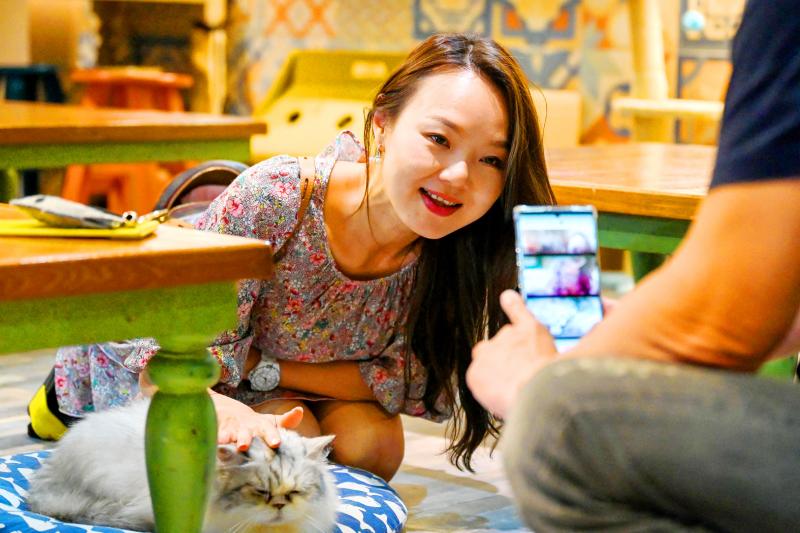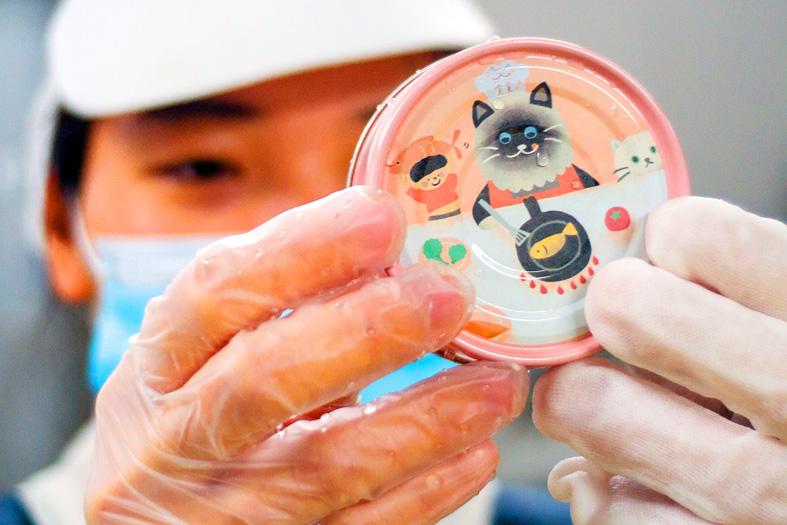Licking its lips imperiously, a ginger cat mops up every last morsel of food from its curly whiskers, clearly undaunted by its supper’s rather unusual base ingredient — silkworm pupae.
The 15 feline residents of the Mao Thai Thai (貓泰泰) cat cafe in New Taipei City’s Linkou District (林口) are among volunteer taste testers sampling a new cat food developed by silkworm experts.
As well as making use of what was previously just a byproduct of silk production, the scientists say the food eliminates harmful intestinal bacteria — with the added bonus of reducing the odor of the cats’ own byproducts.

Photo: Sam Yeh, AFP
“They have more energy and less smelly feces, which is more than I expected,” cafe manager Rosa Su said.
The food comes in normal-sounding flavors — tuna, milkfish, beef and chicken — but the main protein component is insects.
That does not seem to bother Su’s cats, who clamor around her, impatient for their dinner.

Photo: Sam Yeh, AFP
The research team said that much of the feedback from other owners involved in the trial has been positive, too.
At the Council of Agriculture’s century-old Miaoli District Agricultural Research and Extension Station, where the food was created, hundreds of caterpillars wriggle around in trays munching on mulberry leaves.
The facility houses 136 silkworm varieties from all over the world.
The pupa is the intermediate stage in their lifecycle, when they form a cocoon to transition from larva to adult.
“When we see silkworms, we think of silk fabrics,” researcher Liao Chiu-hsun said as she carefully sliced the top off a silk cocoon to extract a squirming brown grub. “But these highly domesticated insects have a lot more to offer.”
The pupae are rich in protein, fat and minerals, but the research team has developed a technique to boost their content of immune proteins that kill harmful bacteria inside the host.
Stressing the silkworms and making them think they are in danger means that they produce more of these proteins in the cocoon, after which they are harvested and turned into cat food.
This innovative use of what was previously mainly a waste product could also be a potential lifeline for the nation’s remaining silkworm farmers. They once numbered in the hundreds, but nowadays only two are still in business.
Third-generation farmer Hsu Wei-chun, 30, said that it is no longer economically feasible to cultivate the insects for fabric alone.
However, mulberry leaves are used to make tea, and cocoons can be used in cosmetics.
“Our competitiveness comes from the ability to use everything,” Hsu said. “We make use of every portion to keep costs down.”
The pet food market presents a lucrative opportunity — animal ownership in the nation is on the rise, and the economy around it is valued at more than US$1 billion.
A can of the silkworm cat food sells for NT$68, a little more than average canned wet food.
“Even though it’s a bit more expensive ... I feel the acceptance level for sustainable and eco-friendly canned food is quite high in Taiwan,” said Lee Wei-ting, department head of Cultural Creativity and Digital Marketing at National United University.
Pet stores in South Korea, Japan, Thailand and the US have expressed interest in the product as well.
The CEO of the company that started mass producing the new food a month ago said that the response has been overwhelming.
“I feel pet owners nowadays are more focused on ingredients,” Eva Liu said. “We used crowdfunding in the beginning as a pre-sale. On the first day, within 24 hours we reached our preliminary goal.”

China might accelerate its strategic actions toward Taiwan, the South China Sea and across the first island chain, after the US officially entered a military conflict with Iran, as Beijing would perceive Washington as incapable of fighting a two-front war, a military expert said yesterday. The US’ ongoing conflict with Iran is not merely an act of retaliation or a “delaying tactic,” but a strategic military campaign aimed at dismantling Tehran’s nuclear capabilities and reshaping the regional order in the Middle East, said National Defense University distinguished adjunct lecturer Holmes Liao (廖宏祥), former McDonnell Douglas Aerospace representative in Taiwan. If

Prosecutors in New Taipei City yesterday indicted 31 individuals affiliated with the Chinese Nationalist Party (KMT) for allegedly forging thousands of signatures in recall campaigns targeting three Democratic Progressive Party (DPP) lawmakers. The indictments stem from investigations launched earlier this year after DPP lawmakers Su Chiao-hui (蘇巧慧) and Lee Kuen-cheng (李坤城) filed criminal complaints accusing campaign organizers of submitting false signatures in recall petitions against them. According to the New Taipei District Prosecutors Office, a total of 2,566 forged recall proposal forms in the initial proposer petition were found during the probe. Among those

ECHOVIRUS 11: The rate of enterovirus infections in northern Taiwan increased last week, with a four-year-old girl developing acute flaccid paralysis, the CDC said Two imported cases of chikungunya fever were reported last week, raising the total this year to 13 cases — the most for the same period in 18 years, the Centers for Disease Control (CDC) said yesterday. The two cases were a Taiwanese and a foreign national who both arrived from Indonesia, CDC Epidemic Intelligence Center Deputy Director Lee Chia-lin (李佳琳) said. The 13 cases reported this year are the most for the same period since chikungunya was added to the list of notifiable communicable diseases in October 2007, she said, adding that all the cases this year were imported, including 11 from

The Ma-anshan Nuclear Power Plant’s license has expired and it cannot simply be restarted, the Executive Yuan said today, ahead of national debates on the nuclear power referendum. The No. 2 reactor at the Ma-anshan Nuclear Power Plant in Pingtung County was disconnected from the nation’s power grid and completely shut down on May 17, the day its license expired. The government would prioritize people’s safety and conduct necessary evaluations and checks if there is a need to extend the service life of the reactor, Executive Yuan spokeswoman Michelle Lee (李慧芝) told a news conference. Lee said that the referendum would read: “Do